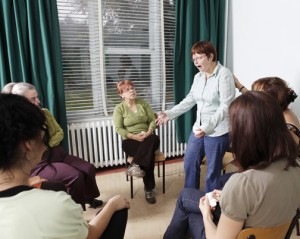 For a working counselor, it’s always a good idea to teach newly recovering folks how to engage successfully in self-help groups, rather than instructing them to take the tour. It’s common for the newly sober is to become discouraged and quit. Doesn’t take much— a cross word, a dirty look (even an imaginary one)— to generate a dropout. Someone in your office with a complaint— “I tried that and it’s not for me.”
For a working counselor, it’s always a good idea to teach newly recovering folks how to engage successfully in self-help groups, rather than instructing them to take the tour. It’s common for the newly sober is to become discouraged and quit. Doesn’t take much— a cross word, a dirty look (even an imaginary one)— to generate a dropout. Someone in your office with a complaint— “I tried that and it’s not for me.”
It helps to recruit a core of volunteers who are provided with instruction in basic motivation. Avoid argument, develop discrepancy— that stuff works. Then link them up the way you might link somebody new in the neighborhood with the Welcome Wagon. Believe me, it makes a difference.
Doesn’t work for everyone, by any means, but those community-based support groups are so important to success I just don’t see how we can ignore them.
I’m a bit tired of hearing counselors complain that such groups don’t work for their patients, when in reality, the patient never gave it a chance. Sending somebody to meetings without some prep work is like making a referral for therapy without bothering to find a therapist. These groups don’t hard-sell newcomers. An introduction helps.
I’d probably be the worst newly recovering person you ever met, because of my asocial nature. I’m the sort who when invited to a party, thinks, “will there be other people there? Then, no.” But in those same circumstances, I hope I’d recognize the need for ongoing support. These groups are often the best place to get it.
Makes no difference whether somebody prefers AA or NA or SMART or LifeLink or the local church group. I just think it helps to bond somewhere. If there’s one lesson we’ve learned, it’s that addicts on their own can struggle.








